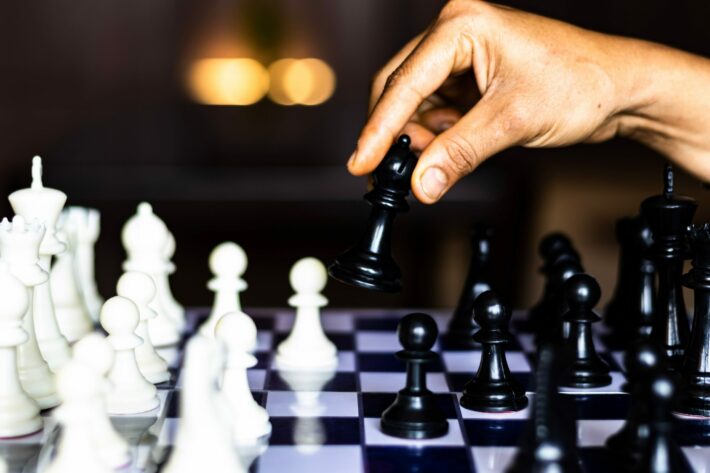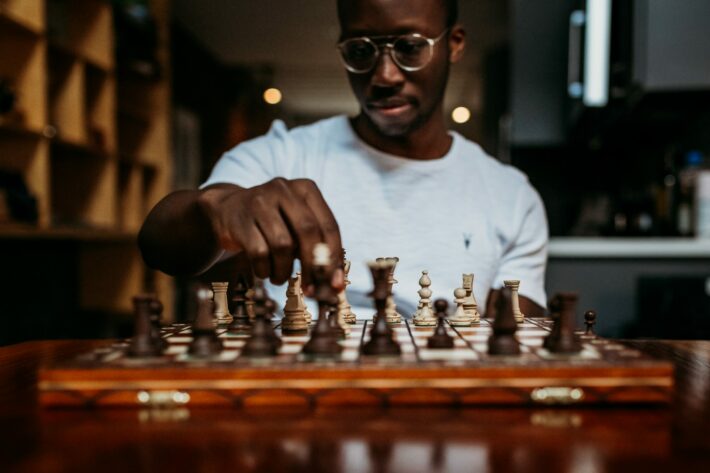Are you ready to conquer the chessboard and emerge victorious? Look no further! In this comprehensive guide, we unveil proven strategies that will propel you toward success in the game of chess. Whether you’re a novice player or an experienced competitor, these invaluable tips and techniques will sharpen your skills and enhance your gameplay.
From mastering the opening moves to calculating complex tactics, we delve into the fundamental elements that can turn the tide in your favor. Get ready to unlock a world of strategic brilliance and dominate the chessboard like a true grandmaster. Let’s dive into these winning strategies together!
What are the best strategies to win at chess?
To achieve victory in chess, it’s crucial to employ effective strategies. Start by mastering the fundamentals of pawn structure, piece development, and controlling the center of the board. Additionally, focus on tactical awareness, calculating moves ahead, and spotting potential threats.
Understanding different opening variations and their strategic implications can provide a solid foundation. Developing a strong mid-game plan, utilizing positional advantages, and exploiting weaknesses in your opponent’s position is essential.
Finally, honing your endgame skills, such as king activity and pawn promotion, can lead to decisive victories. Remember, a combination of sound strategy and tactical prowess is key to winning at chess.
How can I improve my chess gameplay and increase my chances of success?

Improving your chess gameplay requires a dedicated approach. Start by studying classic games played by grandmasters to understand their strategic and tactical decisions. Practice regularly by playing against opponents of varying skill levels, and analyzing your games afterward to identify weaknesses and missed opportunities.
Enhance your tactical skills by solving puzzles and tactical exercises. Study different opening systems and their typical plans to gain familiarity and confidence. Develop a solid understanding of key endgame principles, such as king and pawn endings. Continuous learning, practice, and analysis are essential for enhancing your chess skills and increasing your chances of success.
Which chess tactics should I focus on to improve my winning rate?
Improving your winning rate in chess heavily relies on tactical proficiency. Sharpen your tactical vision by regularly solving puzzles and tactical exercises. Focus on key tactical motifs like pins, forks, skewers, discovered attacks, and double attacks. Improve your calculation skills by visualizing moves ahead and assessing resulting positions accurately.
Be vigilant for tactical opportunities and avoid overlooking tactics, both in your own position and your opponent’s. By developing a strong tactical intuition and regularly practicing tactical patterns, you can significantly enhance your winning rate and exploit tactical opportunities that arise in your games.
What are the essential opening moves for a successful chess game?
Successful chess games often begin with solid opening moves. Focus on controlling the center of the board, either directly or by occupying strategic squares. Popular opening moves like 1.e4 and 1.d4 lead to open and closed game positions, respectively.
Explore different opening systems like the Ruy Lopez, Sicilian Defense, or Queen’s Gambit to understand their typical plans and structures. Aim for harmonious piece development and castle early to ensure king safety. Consider studying opening theory, understanding key ideas, and learning common opening traps to gain an advantage and set the stage for a successful chess game.
How can I develop a strong mid-game strategy in chess?
Developing a strong mid-game strategy is crucial for success in chess. Start by evaluating the position accurately, identifying imbalances, and formulating a plan accordingly. Consider factors like pawn structure, piece activity, king safety, and potential weaknesses in your opponent’s position.
Identify your own strengths and exploit them while minimizing your weaknesses. Look for tactical opportunities and positional advantages, such as controlling key squares, creating open files, or launching an attack on the opponent’s king. Flexibility and adaptability are key as the mid-game requires continuous evaluation and adjustment of your strategy based on changing circumstances.
This table provides valuable insights and practical tips for developing a strong mid-game strategy in chess.
| Mid-game Strategy | Description | Tips |
|---|---|---|
| Open Files | Control and occupy open files to improve piece mobility and facilitate coordination. | – Place rooks on open files for potential attacks.
– Use the open file to double rooks and exert pressure on the opponent’s position. |
| Pawn Breaks | Execute strategic pawn breaks to create weaknesses in the opponent’s pawn structure. | – Identify weak points in the opponent’s pawn structure.
– Plan pawn breaks to open lines for your pieces and disrupt their coordination. |
| Prophylaxis | Anticipate and prevent the opponent’s threats or counterplay. | – Be vigilant of potential tactics or positional maneuvers by your opponent.
– Make defensive moves that neutralize their plans and limit their options. |
| Piece Activity | Activate and coordinate your pieces effectively to maximize their influence on the board. | – Aim to develop all your pieces and avoid leaving any behind.
– Coordinate your pieces to support each other’s actions and control key squares. |
| King Safety | Ensure the safety of your king by timely castling and taking precautions against attacks. | – Castle early to place your king in a secure position.
– Avoid weakening your king’s pawn cover and keep an eye on potential threats. |
What are the key principles of endgame strategies in chess?
Endgame strategies in chess revolve around several key principles. Firstly, activate your king and centralize it to gain an advantage. Create passed pawns by advancing them and supporting their promotion.
Master essential endgame techniques such as opposition, zugzwang, and triangulation. Understand different types of endgames, such as rook endings, queen endings, or pawn endings, and the corresponding strategies for each.
Develop an understanding of theoretical endgame positions and study famous endgame compositions. Enhancing your endgame skills can provide a significant edge, as the endgame often decides the outcome of a chess game.
Are there any specific techniques to improve my chess calculation skills?
Improving chess calculation skills requires deliberate practice. Start by solving puzzles and tactical exercises regularly, focusing on accurate calculation and visualization. Develop pattern recognition to quickly identify tactical motifs and combinations.
Break down complex positions into manageable parts, calculating variations step-by-step. Practice blindfold chess to enhance visualization and mental calculation. Analyze your own games, paying attention to critical positions and calculating alternative moves.
Studying annotated games by strong players can also improve your ability to calculate accurately and efficiently. With consistent practice and an analytical mindset, you can enhance your chess calculation skills and make precise decisions in the heat of the game.
How can I anticipate and counter my opponent’s moves in chess?
Anticipating and countering your opponent’s moves is a vital skill in chess. Firstly, carefully analyze the position, identifying your opponent’s threats, weaknesses, and plans. Stay vigilant for tactical opportunities or potential sacrifices.
Develop a prophylactic mindset, aiming to neutralize your opponent’s plans and restrict their options. Consider pawn breaks, exchanges, and positional maneuvers that undermine their position.
Maintain a flexible strategy, adapting to changing circumstances and responding effectively to your opponent’s moves. By understanding your opponent’s intentions and consistently assessing the position, you can anticipate their moves and formulate strong counterplays.
What are the common mistakes to avoid when trying to win at chess?

Avoiding common mistakes is crucial for success in chess. Steer clear of hasty moves without proper calculation, as they can lead to tactical vulnerabilities. Don’t neglect the piece development and control of the center.
Avoid unnecessary pawn moves that weaken your position or allow your opponent’s pieces to penetrate. Beware of overextending or leaving weak squares in your position. Don’t underestimate your opponent’s threats or overlook tactical possibilities.
Avoid materialistic thinking and focus on long-term strategic advantages. By being mindful of these common mistakes, you can minimize errors and increase your chances of winning in chess.
How can I enhance my positional understanding in chess to secure victories?
Developing a strong positional understanding is vital for securing victories in chess. Study classic games played by positional masters to grasp key concepts and plans. Focus on pawn structure and how it influences piece activity and positional advantages. Pay attention to the imbalance of material, piece activity, king safety, and control of critical squares.
Develop a sense of harmony among your pieces and their coordination. Analyze different types of positions, such as closed, open, or pawn structures with opposite-side castling, to understand their strategic nuances. By deepening your positional understanding, you can make informed decisions and exploit positional advantages to secure victories.
Are there any recommended resources or books to study winning chess strategies?
Several resources and books can aid in studying winning chess strategies. “My System” by Aron Nimzowitsch is a classic that delves into strategic concepts. “The Amateur’s Mind” by Jeremy Silman focuses on positional understanding. “Silman’s Complete Endgame Course” covers endgame strategies comprehensively.
“Winning Chess Strategies” by Yasser Seirawan provides insights into various strategic themes. Online platforms like Chess.com and ChessBase offer interactive lessons, puzzles, and videos on strategy.
Analyzing annotated games by renowned players, such as Kasparov, Karpov, or Fischer, can also provide valuable lessons. By exploring these resources, you can deepen your understanding of winning chess strategies.
What are the advantages of learning and practicing different chess openings?
Learning and practicing different chess openings offer several advantages. Firstly, it broadens your understanding of various strategic and tactical ideas. Different openings lead to diverse types of positions, allowing you to develop a versatile playing style. Studying openings improves your opening repertoire, enabling you to surprise opponents and catch them off guard.
Understanding opening theory provides a solid foundation for the middlegame, as you’ll be familiar with typical plans and maneuvers. Additionally, learning different openings enhances your overall chess knowledge, helping you recognize patterns and improve your overall gameplay.
How can I develop a solid defense strategy to protect my pieces and secure wins?
Developing a solid defense strategy is crucial for chess success. Firstly, prioritize king safety by castling early and keeping your king protected. Be attentive to your opponent’s threats and calculate defensive moves accurately. Develop a strong sense of prophylaxis, anticipating and neutralizing potential attacks before they materialize.
Maintain harmonious piece coordination, ensuring your pieces defend each other effectively. Look for opportunities to counterattack or create counterplay to keep your opponent’s pieces occupied. By focusing on a solid defense strategy, you can protect your pieces, minimize vulnerabilities, and position yourself for winning opportunities.
Are there any psychological aspects to consider when aiming for success in chess?

Psychological aspects play a significant role in chess success. Confidence is essential, as believing in your abilities can positively impact your decision-making. Maintain a calm and focused mindset, avoiding emotional reactions to setbacks or unexpected moves.
Patience is crucial, as chess requires strategic maneuvering and waiting for the right opportunities. Develop resilience to handle pressure and setbacks during a game. Analyze your opponent’s psychology, seeking to exploit their weaknesses and induce mistakes. Understanding the psychological dynamics of the game can give you a competitive edge and contribute to your success in chess.
Given these points
Mastering the strategies for success in chess is a journey that requires dedication, practice, and continuous learning. By implementing effective tactics and developing a strong understanding of openings, mid-game maneuvers, and endgame principles, players can significantly increase their chances of winning.
It is crucial to analyze games, study annotated masterpieces, and leverage available resources to sharpen skills and stay up to date with the latest strategic insights. Remember, chess is not only a game of skill but also a mental battle that requires psychological resilience and adaptability.
With perseverance and a strategic mindset, anyone can unlock their potential and emerge victorious on the chessboard. So, embark on this chess adventure, explore winning strategies, and enjoy the thrill of outmaneuvering your opponents in this timeless game of strategy.




